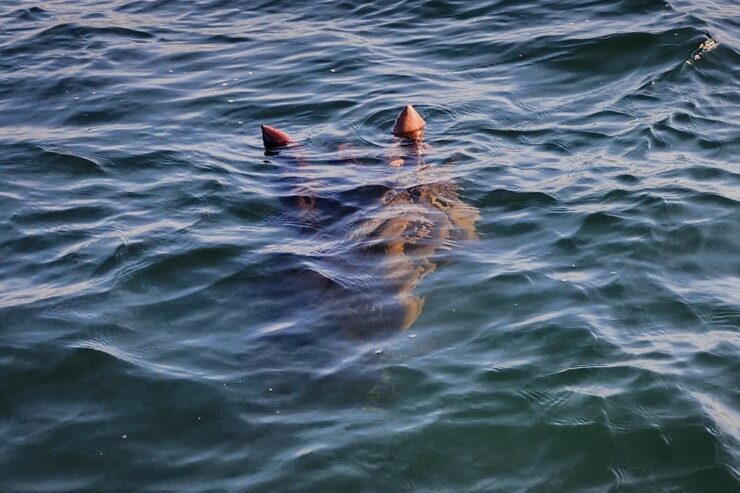As we wrap the latest chapter of the SFF Bestiary, I’m drowning in a plethora of mermaid films. It took me a while to decide which one to focus on, but ultimately the choice was not too difficult. I picked the one that best expressed the spirit of silly season.
There are actually two Chinese films called The Mermaid. The 2016 film that’s better known (and a huge hit) is Stephen Chow’s comedy-romance about an obnoxious billionaire who’s killing off merpeople with his nifty new sonar invention. In that one, the mermaid is charged with killing him, but ends up in love with him instead.
That’s not The Mermaid I found. The one I watched premiered in 2021, and is just about a point-for-point hommage to that great American classic, Splash, but with more mermaid backstory. The human love interest is a conflation of the Tom Hanks and Eugene Levy characters, and the mermaid has hidden depths—and a whole new family.
Here the focus is on the research scientists who are looking for proof of the existence of mermaids. Evil senior scientist (complete with villainous pencil mustache) sets up trap to catch one. Adorable young marine biologist leads the attack.
But first we see a pair of fishermen, and a mermaid who swims up to the boat and seduces one of them. The other comes at her with a knife, but she escapes. The leader of her clan—the subtitles call him “Patriarch”—rises up to smite the fishermen with swirls of blue magic.
He hasn’t killed them; he’s cast them into a trance. They’ll wake, he says to the whole clan as it rises out of the waves, with no memory of what happened. That’s one of the mermaids’ powers.
And then comes the attack, and the capture of the mermaid who originally approached the boat. But adorable young marine biologist falls overboard in the aftermath, and wakes up in a strange beachy sort of house, with an adorably perky young woman who informs him that she’s his bride-to-be.
He’s apparently come to shore as a castaway, and been taken in by a human tribe. It’s their law, his rescuer tells him, that since she’s saved his life, he has to marry her. He is absolutely not on board with this, but masked clansmen convince him that it’s wise to submit. There’s a wedding on the beach, officiated by another masked man, and sealed with bracelets that serves as tokens of their love.
Or her love. His is not voluntary. As soon as he can, he steals a boat and escapes.
Which is all well and good, until he gets lost on his way home—and his bride pops up from under a tarp and declares brightly that she knows where to go. She’ll guide him in the right direction.
The next time we see them, they’re in a glittering city, and they’re entering his apartment, still dressed in castaway clothes. (We won’t ask how they got from the harbor to the apartment, or what people thought of two very grubby people in fairly minimalist outfits. They must have had to walk; she wouldn’t have any money or ID, and he probably doesn’t, either. These are the sorts of questions Splash has taught us not to ask.)
There’s much more going on than adorable young marine biologist Yang Fan realizes. Equally adorable mermaid Xiaoyu has been reading popular magazines to find out how human love works (shades of Aquamarine). She’s on a mission to rescue her captive sister and shut down the research project.
While she and her reluctant (but increasingly less so) husband explore the city, equip her with the latest fashions, and introduce her to the outer levels of his workplace, the evil scientist and his second-favorite marine biologist have discovered a substance secreted by mermaids, which causes amnesia in humans. Of course it has strategic implications. They’ve been torturing their captive in order to obtain it.
Yang Fan is very much against torture, but he’s not the man in charge. He soon deduces that Xiaoyu is a mermaid, though she has a magical pearl that prevents her legs from transforming into a tail when touched by water. As his feelings change toward her, he ends up on her side, and helps her clan infiltrate the research facility and rescue her sister.
There’s the iconic scene, of course, with the mermaid in the bathtub. We cannot have a mermaid movie without it. And the mermaid in the tank is deteriorating terribly, and suffering accordingly.
The end is surprisingly not warm and fuzzy. In order to save Yang Fan’s life after he’s nearly killed in the rescue attempt, Xiaoyu has to use up the power of the pearl. She’s already used it to wake his father from a coma—a proof of her love, though Yang Fan doesn’t know it. If she uses it again, she can save him, but she can never return to human form. She’s bound forever to her mermaid’s tail, and to the sea.
Even worse, once he’s saved, Yang Fan will have no memory of her. That’s the mermaid’s gift and curse.
In that way, the film echoes the original fairy tale. The mermaid sacrifices everything for the human beloved. He never knows, or in this case remembers.
Or maybe not quite. Yang Fan is drawn to the sea. He spends long hours on the shore with his father in a wheelchair, staring out at the waves.
It’s a great film to watch on late-night television, with its special effects reminiscent of vintage Doctor Who and Sixties sci-fi adventures, and its many echoes of Splash. What’s even more fun is the streaming algorithm which follows it with a whole succession of progressively more obscure and downright weird mermaid-themed movies. Last time I watched it, I found myself sitting up at midnight, unable to look away from something called Mermaid Down.
I am not a fan of horror in general, or of gratuitous cruelty, but this ended up being surprisingly satisfying. It’s a weird combination of fishermen setting out to capture a mermaid and sell her for a fortune, truly horrible mistreatment of the captive (cut her tail off, sell the two pieces, get rich), evil research scientist (in this case, a psychiatrist who has Plans for the human half), and then suddenly we’re in a mental institution with a quirky and dare I say it delightful collection of young women patients and one older woman doctor. And Things in the basement. And a ghost.
It has to be seen to be believed. The mermaid can’t speak, though she makes squealing sounds. She communicates in a rudimentary form of ASL, which one of the patients (and the ghost) can mostly interpret. (Shades of The Shape of Water.) It starts as a repellent form of slasher film (though the gore level is minimal) and turns into a celebration of female empowerment. With mermaid. And ghost.
If I’d been able to stay awake past that, I could have been treated to the straightforward horror of Mermaid’s Song. And there’s also commenter Elise’s recommendation, The Lure. Horror and musical and dark comedy. That’s one I have on my list for watching later, though we’re done with this chapter now, and looking toward the new year with a new chapter and a whole new set of weird and wonderful creatures from the SFF universe.
Judith Tarr is a lifelong horse person. She supports her habit by writing works of fantasy and science fiction as well as historical novels, many of which have been published as ebooks. She’s written a primer for writers who want to write about horses: Writing Horses: The Fine Art of Getting It Right. She lives near Tucson, Arizona with a herd of Lipizzans, a clowder of cats, and a blue-eyed dog.














